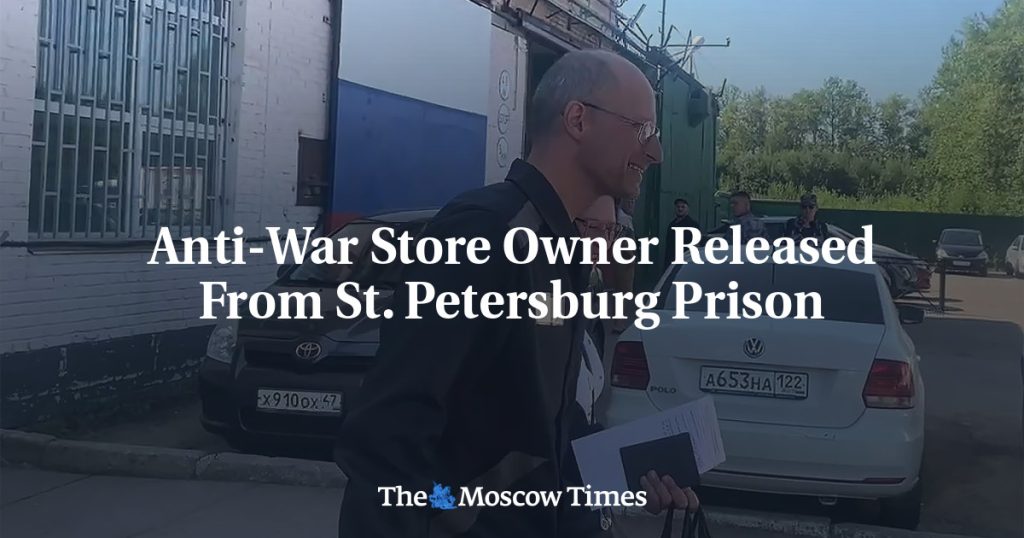A store owner in St. Petersburg, Dmitry Skurikhin, was released from prison after being jailed for publicly opposing the war in Ukraine. He was sentenced to one year and six months for “discrediting” the Russian military by painting his store with pacifist slogans. Skurikhin was arrested after staging a one-man picket outside his store to mark the one-year anniversary of Russia’s invasion of Ukraine. The time he spent in pre-trial detention was counted towards his prison sentence. Russian authorities fined Skurikhin for his anti-war activism before launching the criminal case that led to his imprisonment.
Videos and photos shared by the news outlet Bumaga showed Skurikhin in prison attire being greeted by his wife and family outside a penal colony in St. Petersburg upon his release. Skurikhin, who has been critical of Russian military actions in Ukraine since 2014, did not comment on whether he intended to continue his anti-war activism in a country that has cracked down on dissent in recent years. Despite his release, the situation in Russia remains challenging for independent journalists and activists, as organizations like The Moscow Times have been labeled “undesirable” and face prosecution for their work.
The Moscow Times has been designated as an “undesirable” organization by Russia’s Prosecutor General’s Office, criminalizing their work and putting their staff at risk of prosecution. The newspaper has also been unjustly labeled as a “foreign agent.” The authorities aim to silence independent journalism, claiming that their work discredits the decisions of the Russian leadership. The journalists of The Moscow Times refuse to be silenced and are asking for support to continue their work. By supporting The Moscow Times, readers can defend open and independent journalism in the face of repression, making a significant impact through their contributions.
The challenges faced by independent journalists and activists in Russia highlight the ongoing crackdown on dissent and freedom of speech in the country. Critics of the government and those who oppose military actions, such as Skurikhin, are targeted and prosecuted for their views. The situation has made it increasingly difficult for individuals to express their opinions and speak out against government actions without fear of reprisal. The silencing of independent journalism and suppression of dissenting voices is a concerning trend that restricts the flow of information and undermines democracy.
The release of Dmitry Skurikhin from prison serves as a reminder of the risks faced by individuals who dare to speak out against government policies in Russia. Despite the challenges and threats to their safety, activists and journalists like Skurikhin and those at The Moscow Times continue to push for transparency and accountability in a climate of repression. The support and solidarity of readers and the international community are crucial in defending the principles of free speech, independent journalism, and the right to dissent. By standing with those who face persecution for their beliefs, individuals can help uphold fundamental human rights and uphold democratic values in the face of suppression.
The case of Dmitry Skurikhin sheds light on the broader issues of censorship, crackdown on dissent, and the importance of independent media in Russia. By highlighting individual stories of those who have faced persecution for their beliefs, it becomes evident that the struggle for freedom of speech and human rights is ongoing and requires sustained support from the public. The release of Skurikhin should serve as a call to action for those who value democratic principles and believe in the power of independent journalism to hold governments accountable. As the fight for press freedom continues in Russia and other parts of the world, solidarity with those on the frontlines of this battle is crucial in defending democracy and the right to free expression.


